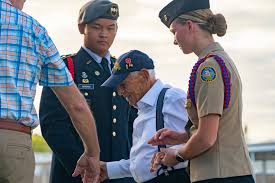Florida Reform School Survivors Demand Justice: Will They Finally Get the Restitution They Deserve?
During the height of the Jim Crow era in the 1960s, the facility now called the Dozier School for Boys housed as many as 500 boys.
Hundreds of individuals who allege they endured severe physical and sexual abuse at two state-operated reform schools in Florida are now poised to receive significant financial restitution from the state. This development follows a formal apology from Florida lawmakers, acknowledging the unimaginable suffering these individuals endured as children over half a century ago.
One of these institutions, now known as the Dozier School for Boys, reached its peak operation during the Jim Crow era of the 1960s. At that time, it housed approximately 500 boys, many of whom were sent there for minor infractions such as petty theft, skipping school, or running away from home. The school also served as a destination for orphaned and abandoned children, who had no other place to go.

The Dozier School, which operated for more than 100 years, was notorious for its harsh conditions and practices. Over the decades, it became a symbol of systemic cruelty and neglect, with many survivors describing it as a place of relentless suffering. Today, the restitution efforts and the state’s apology are seen as long-overdue steps toward acknowledging and addressing this dark chapter in Florida’s history.
In recent years, hundreds of men have come forward with harrowing accounts of their experiences at the infamous Dozier School for Boys, located in the panhandle town of Marianna, Florida. These survivors have described brutal beatings, sexual assaults, and mysterious deaths and disappearances that plagued the institution during its operation. Between 1900 and 1973, nearly 100 boys are known to have died at Dozier, with some deaths attributed to gunshot wounds or blunt force trauma. While some of the deceased were sent home for burial, others were interred in unmarked graves on the school’s grounds—graves that were only discovered by researchers in recent years.
As the state of Florida faced a December 31 deadline for restitution claims, more than 800 applications poured in from individuals who had been held at the Dozier School or its sister institution in Okeechobee. These applicants detailed the severe physical, mental, and sexual abuse they endured at the hands of school staff. In response, Florida lawmakers last year allocated $20 million in compensation to be divided equally among the surviving victims of both schools, marking a significant step in addressing the long-standing injustices.
Among those seeking justice is Bryant Middleton, a former Dozier resident who first spoke out publicly in 2017 when lawmakers formally acknowledged the atrocities committed at the school. Middleton recounted being sent to Dozier between 1959 and 1961, where he endured six brutal beatings for minor infractions, including eating blackberries off a fence and mispronouncing a teacher’s name. Reflecting on his experiences, Middleton, a Vietnam veteran who served more than 20 years in the Army, said, “I’ve seen a lot in my lifetime. A lot of brutality, a lot of horror, a lot of death. I would rather be sent back into the jungles of Vietnam than to spend one single day at the Florida School for Boys.”
The dark history of abuse at the Dozier School dates back to its earliest days, shortly after its opening in 1900. Allegations of cruelty emerged, including reports of children being chained to walls with iron restraints. The appalling conditions persisted for decades, culminating in a 1968 visit by then-Governor Claude Kirk. During his inspection, Governor Kirk discovered a facility in extreme disrepair, with leaking ceilings, holes in the walls, no heating for the winter months, and buckets being used as toilets. These revelations further underscored the long-standing neglect and mistreatment that defined the institution’s operation for over a century.
Reflecting on the horrific conditions at the Dozier School for Boys, former Florida Governor Claude Kirk once remarked, “If one of your kids were kept in such circumstances, you’d be up there with rifles.” His stark words underscored the appalling neglect and abuse that plagued the institution for decades.
The state of Florida ultimately closed the Dozier School in 2011 after a series of state and federal investigations, along with damning news reports, brought its dark legacy of abuse to light. The closure marked the end of more than a century of systemic cruelty inflicted on the vulnerable boys who were sent there.
Today, as the survivors of Dozier and its sister school in Okeechobee await restitution for the trauma they endured, their resilience is being commemorated in the upcoming film Nickel Boys. The movie is adapted from Colson Whitehead’s Pulitzer Prize-winning novel, which was inspired by the true stories of abuse at Dozier. Whitehead has publicly acknowledged that the school served as the model for his haunting depiction of a fictional reform school in the book.
Through Nickel Boys, Whitehead hopes to preserve the memory of the victims and their stories. “So that the victims and their stories are not forgotten,” he has said, emphasizing the importance of raising awareness about this grim chapter in Florida’s history. The film serves not only as a testament to the survivors’ endurance but also as a call to ensure that such atrocities are never repeated.


Comments are closed, but trackbacks and pingbacks are open.